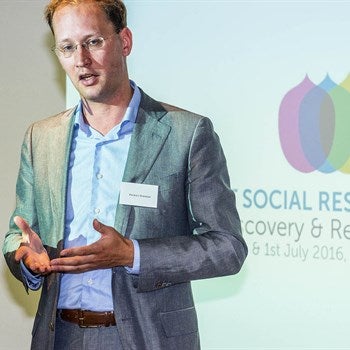The idea is simple: the group gathers every five to six weeks for a two-hour discussion. The only prerequisite for attending a meeting is that you must read the assigned text beforehand. “What I like so much about it is that students want to do this in addition to their study work” says Patrick. So far, the reading club has treated a pretty impressive list of texts - “texts you ought to have read” according to Patrick. From Cicero’s De Officciis to Thomas More’s Utopia and from two essays by Hannah Arendt to The Wealth of Nations by Adam Smith. “Every time we have a very open conversation. And every time, we arrive at current political affairs. The students very quickly make a connection with today’s world. And that’s important. We want to understand the text itself, but we also definitely want the texts to shine light on contemporary politics and society."
What is the added value of the book club to the curriculum?
"This is the most important thing that happens at University as far as I am concerned. Matters such as exams and education regulations are only there to ensure that the educational process runs smoothly. It is based on suspicion, assuming that students may commit fraud and need a grade to be able to say what they are worth on the labor market. But pure learning for the sake of learning itself, is done in the context of a club like this. Of course, that happens in regular courses as well. But the question “do we need to know this for the exam?” is always lingering. That’s just not the case with the reading club; it’s purely intrinsic.”
Which text triggered the biggest response?
“The book Why not socialism? by Gerald Cohen. There was a sort of separation of minds, with some confessing themselves to be democratic socialists and others not. The booklet also invites a bit of debate. He starts with an example of a camping trip where a group of friends go on holiday together. Then you also share everything with each other, so why would you not do that in society, too? How do you organize a society based on sharing instead of on earnings and possessions? That’s when I noticed that socialism has made a comeback. When I was in college, socialism was kind of dead. We had just experienced the fall of the Berlin Wall and few dared to call themselves a socialist out loud anymore. But now with Bernie Sanders and so on, many young people have been truly touched by socialism. So we had a serious discussion about that.”
Who can join the club?
"All Bachelor’s and Master’s students of Political Science. Some have already asked me whether they are allowed to stay in the club after graduation. Of course: they’re always welcome! I’ve forged a special bond with them."
Anything else you would like to share with the department?
"Other colleagues could the same of course. I’ve started a club focussed on political theory, but I would wholeheartedly recommend other colleagues in empirical political science, comparative political science, or international relations to do the same. It is good for your own development, it is good for your relationship with students, and it is motivating. Of course I'm busy, but I think this is so important and valuable that I really want to do it in my own time. This is exactly how things can get really interesting at University."
